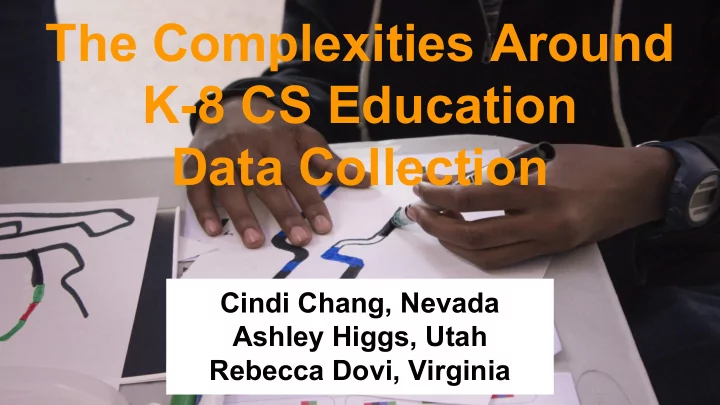

The Complexities Around K-8 CS Education Data Collection Cindi Chang, Nevada Ashley Higgs, Utah Rebecca Dovi, Virginia
Please introduce yourself and what role you have with regard to computer science education in your state?
Talking Points ● What can be measured in the K-5 or K-8 levels? ● How can we measure computer science education that is integrated? ● How can we guarantee computer science is being taught? ● What things should we consider while working in the K-8 computer science education area?
Talking Point #1: What can be measured in K-5 or K-8 levels? ● Surveys, artifacts, numbers of teachers who have had PD ● Online program usage / online LMS ● Computer science road maps - what do the districts already have to do (ie. technology plan; formulate a one-pager that can be handed out to that school tech committee ● Learning.com has created an online assessment that school districts are using (not high stakes testing) ● Pull out the terminology with teachers - do you use abstraction, looping, etc ● Is there a tech integration specialist at that school; what is expected of that person, is it aligned in CS ● Micro credentialing - train local district folks to do local testing, data on folks getting those ● Administrators in the schools should be accountable for observations ● MA - one-pager “what to look for in the classroom for Computer Science?” ● Math/Science Computational Thinking framework ● Badges for ES teachers: CS pioneer - teachers who have completed their first lesson, CS collaborator - worked with someone else on a lesson, CS coach - trains other teachers, CS Explorer - tried computer science lessons multiple times
Talking Point #1 cont’d: What can be measured in K-5 or K-8 levels? ● ECEP - point person to gather the data from curriculum providers such as Code.org platform for state data usage ● Classroom level (pre and post assessments) - time consuming ● standards -based grading ● Participation in activities / competitions ● Survey the number of teachers who have participated in CS Professional Development ● Survey - teacher self-efficacy and comfort level in teaching CS and even particular CS standards ● MS - measure participation in CS course electives ● Teacher lesson plans that incorporate CS instruction - projects, rubrics, self-tracking of standards being taught ● Observations of teaching ● CS Access / participation ⇒ affecting math or science outcomes (correlational data) ● Measure use of certain vocabulary ● Tech integration specialist - do they have one; measure resources in school ● Collect digital artifacts created by students
Talking Point #2: How can we measure computer science education that is integrated? ● National Elementary Principals Association / Secondary Principals - add CS to their survey ● Surveys to the teachers ● Non high stakes observations by principals of whether CS is being taught in the classroom ● Hook into surveys from School Association organizations - problems may exist with honesty ● Capstone project by groups of students to measure mastery ● Use a secondary code in teacher/course/student data collections ● Via PowerSchool - collect info on student enrollment (maybe only MS??) ● Determine if known curriculum is being taught (e.g. Code.org) ● Integrated NSF projects like Bootstrap and Project GUTS, and report back to them ● NGSS and Common Core could include computational thinking and CS ● Provide CS software/programs where data collection is built in ● Make it part of state’s existing data collection processes ● Down the road: teacher evaluation plans as a metric
Talking Point #3: How can we guarantee computer science is being taught? ● Down the road - do you see an increase in enrollment in high school courses? Increase in ethnicity in CS courses ● Districts can be required to sign statements of assurance which impact accreditation. ● Observation / Learning Walks ● K-8 standards implementation ● Surveys - but difficult to get meaningful response ● Collect sample student work as evidence - provide recognition ● Partner with National Principals Associations (ES, MS, HS) to survey people ● Work with Google to access data from Gallup survey at the state level ● Teacher landscape surveys ● It’s easy to know what’s going on if you’re the one providing the funding to make it happen ● Get Code.org to show their tracking data
Talking Point #4: What things should we consider while working in the K-8 computer science education area? ● Access participation, engagement, etc with CS activities - i.e. Girls Who Code activity on Saturday that enrollment goes quickly ● K-8 Lead Teacher program in Arkansas ● Arkansas included CS education in their ESSA plan ● VA includes it in school accreditation planning - principals have to account for this ● Interview the folks in your state who integrated prior subject areas - i.e. financial literacy, etc ● What is the saturation of devices in the K-8 grade levels in your state ● Diversity and inclusion ● Motivations for universities to develop CS ed certificates, degrees, etc AND get teachers to enroll in such programs ● Informal ed participation ● Varying methods of implementation ● K-5: consider a separate computer teacher like an art / music teacher [to support classroom work] Title 1, etc; K-8: short form separate course
K-8 ECEP Working Group If you are interested in being a part of an ECEP K-8 Working Group, please contact Sarah Dunton at sdunton@cs.umass.edu or 413.577.0393.
Contact Info Cindi Chang Nevada Department of Education, Computer Science / STEM cchang@doe.nv.gov Rebecca Dovi Director of Education CodeVA rebeccadovi@codevirginia.org Ashley Higgs Utah Department of Education, CTE K-8 Education ashley.higgs@schools.utah.gov
Recommend
More recommend